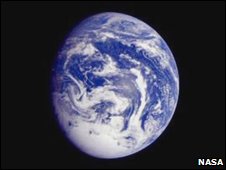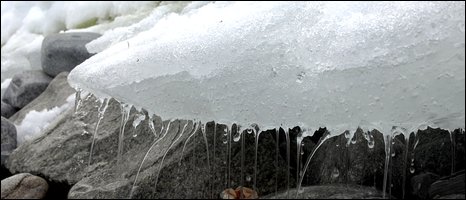Link to article
What happened to global warming?
By Paul Hudson
Climate correspondent, BBC News

 Average temperatures have not increased for over a decade
Average temperatures have not increased for over a decade
This headline may come as a bit of a surprise, so too might that fact that the warmest year recorded globally was not in 2008 or 2007, but in 1998.
But it is true. For the last 11 years we have not observed any increase in global temperatures.
And our climate models did not forecast it, even though man-made carbon dioxide, the gas thought to be responsible for warming our planet, has continued to rise.
So what on Earth is going on?
Climate change sceptics, who passionately and consistently argue that man's influence on our climate is overstated, say they saw it coming.
They argue that there are natural cycles, over which we have no control, that dictate how warm the planet is. But what is the evidence for this?
During the last few decades of the 20th Century, our planet did warm quickly.
 Recent research has ruled out solar influences on temperature increases
Recent research has ruled out solar influences on temperature increases
Sceptics argue that the warming we observed was down to the energy from the Sun increasing. After all 98% of the Earth's warmth comes from the Sun.
But research conducted two years ago, and published by the Royal Society, seemed to rule out solar influences.
The scientists' main approach was simple: to look at solar output and cosmic ray intensity over the last 30-40 years, and compare those trends with the graph for global average surface temperature.
And the results were clear. "Warming in the last 20 to 40 years can't have been caused by solar activity," said Dr Piers Forster from Leeds University, a leading contributor to this year's Intergovernmental Panel on Climate Change (IPCC).
But one solar scientist Piers Corbyn from Weatheraction, a company specialising in long range weather forecasting, disagrees.
He claims that solar charged particles impact us far more than is currently accepted, so much so he says that they are almost entirely responsible for what happens to global temperatures.
He is so excited by what he has discovered that he plans to tell the international scientific community at a conference in London at the end of the month.
If proved correct, this could revolutionise the whole subject.
Ocean cycles
What is really interesting at the moment is what is happening to our oceans. They are the Earth's great heat stores.


 In the last few years [the Pacific Ocean] has been losing its warmth and has recently started to cool down
In the last few years [the Pacific Ocean] has been losing its warmth and has recently started to cool down

According to research conducted by Professor Don Easterbrook from Western Washington University last November, the oceans and global temperatures are correlated.
The oceans, he says, have a cycle in which they warm and cool cyclically. The most important one is the Pacific decadal oscillation (PDO).
For much of the 1980s and 1990s, it was in a positive cycle, that means warmer than average. And observations have revealed that global temperatures were warm too.
But in the last few years it has been losing its warmth and has recently started to cool down.
These cycles in the past have lasted for nearly 30 years.
So could global temperatures follow? The global cooling from 1945 to 1977 coincided with one of these cold Pacific cycles.
Professor Easterbrook says: "The PDO cool mode has replaced the warm mode in the Pacific Ocean, virtually assuring us of about 30 years of global cooling."
So what does it all mean? Climate change sceptics argue that this is evidence that they have been right all along.
They say there are so many other natural causes for warming and cooling, that even if man is warming the planet, it is a small part compared with nature.
But those scientists who are equally passionate about man's influence on global warming argue that their science is solid.
The UK Met Office's Hadley Centre, responsible for future climate predictions, says it incorporates solar variation and ocean cycles into its climate models, and that they are nothing new.
In fact, the centre says they are just two of the whole host of known factors that influence global temperatures - all of which are accounted for by its models.
In addition, say Met Office scientists, temperatures have never increased in a straight line, and there will always be periods of slower warming, or even temporary cooling.
What is crucial, they say, is the long-term trend in global temperatures. And that, according to the Met office data, is clearly up.
To confuse the issue even further, last month Mojib Latif, a member of the IPCC (Intergovernmental Panel on Climate Change) says that we may indeed be in a period of cooling worldwide temperatures that could last another 10-20 years.
 The UK Met Office says that warming is set to resume
The UK Met Office says that warming is set to resume
Professor Latif is based at the Leibniz Institute of Marine Sciences at Kiel University in Germany and is one of the world's top climate modellers.
But he makes it clear that he has not become a sceptic; he believes that this cooling will be temporary, before the overwhelming force of man-made global warming reasserts itself.
So what can we expect in the next few years?
Both sides have very different forecasts. The Met Office says that warming is set to resume quickly and strongly.
It predicts that from 2010 to 2015 at least half the years will be hotter than the current hottest year on record (1998).
Sceptics disagree. They insist it is unlikely that temperatures will reach the dizzy heights of 1998 until 2030 at the earliest. It is possible, they say, that because of ocean and solar cycles a period of global cooling is more likely.
One thing is for sure. It seems the debate about what is causing global warming is far from over. Indeed some would say it is hotting up.
What happened to global warming?
By Paul Hudson
Climate correspondent, BBC News


This headline may come as a bit of a surprise, so too might that fact that the warmest year recorded globally was not in 2008 or 2007, but in 1998.
But it is true. For the last 11 years we have not observed any increase in global temperatures.
And our climate models did not forecast it, even though man-made carbon dioxide, the gas thought to be responsible for warming our planet, has continued to rise.
So what on Earth is going on?
Climate change sceptics, who passionately and consistently argue that man's influence on our climate is overstated, say they saw it coming.
They argue that there are natural cycles, over which we have no control, that dictate how warm the planet is. But what is the evidence for this?
During the last few decades of the 20th Century, our planet did warm quickly.

Sceptics argue that the warming we observed was down to the energy from the Sun increasing. After all 98% of the Earth's warmth comes from the Sun.
But research conducted two years ago, and published by the Royal Society, seemed to rule out solar influences.
The scientists' main approach was simple: to look at solar output and cosmic ray intensity over the last 30-40 years, and compare those trends with the graph for global average surface temperature.
And the results were clear. "Warming in the last 20 to 40 years can't have been caused by solar activity," said Dr Piers Forster from Leeds University, a leading contributor to this year's Intergovernmental Panel on Climate Change (IPCC).
But one solar scientist Piers Corbyn from Weatheraction, a company specialising in long range weather forecasting, disagrees.
He claims that solar charged particles impact us far more than is currently accepted, so much so he says that they are almost entirely responsible for what happens to global temperatures.
He is so excited by what he has discovered that he plans to tell the international scientific community at a conference in London at the end of the month.
If proved correct, this could revolutionise the whole subject.
Ocean cycles
What is really interesting at the moment is what is happening to our oceans. They are the Earth's great heat stores.




According to research conducted by Professor Don Easterbrook from Western Washington University last November, the oceans and global temperatures are correlated.
The oceans, he says, have a cycle in which they warm and cool cyclically. The most important one is the Pacific decadal oscillation (PDO).
For much of the 1980s and 1990s, it was in a positive cycle, that means warmer than average. And observations have revealed that global temperatures were warm too.
But in the last few years it has been losing its warmth and has recently started to cool down.
These cycles in the past have lasted for nearly 30 years.
So could global temperatures follow? The global cooling from 1945 to 1977 coincided with one of these cold Pacific cycles.
Professor Easterbrook says: "The PDO cool mode has replaced the warm mode in the Pacific Ocean, virtually assuring us of about 30 years of global cooling."
So what does it all mean? Climate change sceptics argue that this is evidence that they have been right all along.
They say there are so many other natural causes for warming and cooling, that even if man is warming the planet, it is a small part compared with nature.
But those scientists who are equally passionate about man's influence on global warming argue that their science is solid.
The UK Met Office's Hadley Centre, responsible for future climate predictions, says it incorporates solar variation and ocean cycles into its climate models, and that they are nothing new.
In fact, the centre says they are just two of the whole host of known factors that influence global temperatures - all of which are accounted for by its models.
In addition, say Met Office scientists, temperatures have never increased in a straight line, and there will always be periods of slower warming, or even temporary cooling.
What is crucial, they say, is the long-term trend in global temperatures. And that, according to the Met office data, is clearly up.
To confuse the issue even further, last month Mojib Latif, a member of the IPCC (Intergovernmental Panel on Climate Change) says that we may indeed be in a period of cooling worldwide temperatures that could last another 10-20 years.

Professor Latif is based at the Leibniz Institute of Marine Sciences at Kiel University in Germany and is one of the world's top climate modellers.
But he makes it clear that he has not become a sceptic; he believes that this cooling will be temporary, before the overwhelming force of man-made global warming reasserts itself.
So what can we expect in the next few years?
Both sides have very different forecasts. The Met Office says that warming is set to resume quickly and strongly.
It predicts that from 2010 to 2015 at least half the years will be hotter than the current hottest year on record (1998).
Sceptics disagree. They insist it is unlikely that temperatures will reach the dizzy heights of 1998 until 2030 at the earliest. It is possible, they say, that because of ocean and solar cycles a period of global cooling is more likely.
One thing is for sure. It seems the debate about what is causing global warming is far from over. Indeed some would say it is hotting up.
